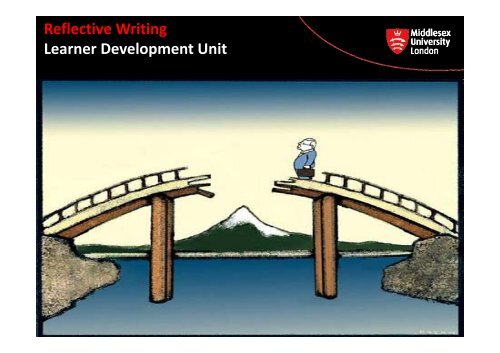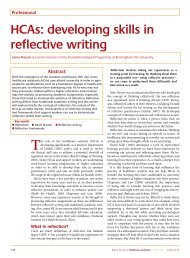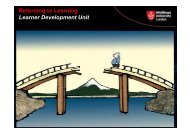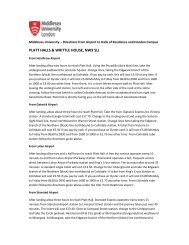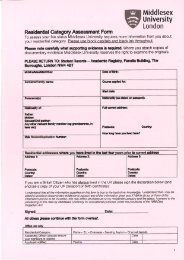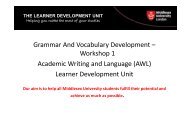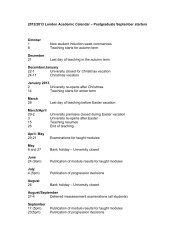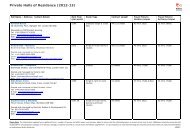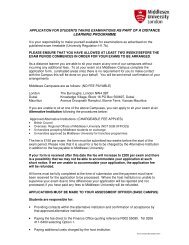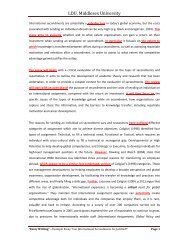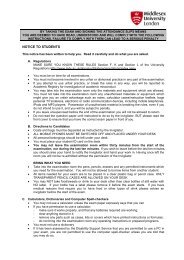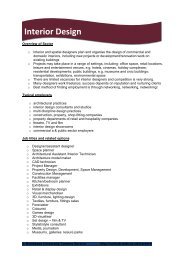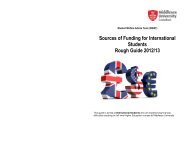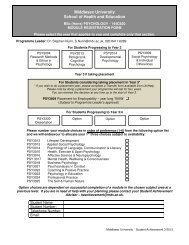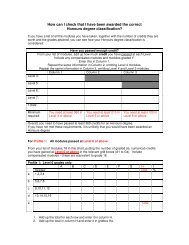Reflective Writing Learner Development Unit p - UniHub
Reflective Writing Learner Development Unit p - UniHub
Reflective Writing Learner Development Unit p - UniHub
You also want an ePaper? Increase the reach of your titles
YUMPU automatically turns print PDFs into web optimized ePapers that Google loves.
<strong>Reflective</strong> <strong>Writing</strong><br />
<strong>Learner</strong> <strong>Development</strong> p<br />
<strong>Unit</strong>
Overview<br />
• To reflect on why you’re asked to do it<br />
• To reflect on the concept of reflection<br />
• To focus on key features of effective reflective<br />
To focus on key features of effective reflective<br />
writing
Different forms of assessment on<br />
university i it courses<br />
• Essays<br />
• Reports<br />
• Presentations<br />
• Performances<br />
• Products<br />
• Dissertations<br />
• <strong>Reflective</strong> writing<br />
• Reviews
Differences between <strong>Reflective</strong><br />
<strong>Writing</strong> and an Academic Essay<br />
PDP, diary, log, reflective<br />
journal, etc.<br />
Academic essay<br />
Analysis of personal experience Analysis of theory, concept, other<br />
writers’ perspectives<br />
Slightly g ymore informal style y ( (first More formal academic style. y<br />
person ‘I’ can be used, but don’t<br />
overuse it)<br />
Generally avoids first person singular<br />
Purpose: to evaluate personal<br />
experience in order to move forward<br />
Purpose: to synthesise and evaluate<br />
the work of others before arriving at a<br />
balanced conclusion.
What do good reflective writing<br />
& academic essays have in common?<br />
ARGUMENTATION AND ANALYSIS<br />
Gi Giving i reasons ffor a particular i l point i of f view i or<br />
perspective – explaining why<br />
Building up a body of evidence to support this<br />
perspective – using other writers’ work, DVDs,<br />
websites, TV recordings, etc<br />
Gi Giving i examples l to t support t your id ideas<br />
Being precise and logical
Description versus analysis: A<br />
painting p gby y<br />
Henri Rousseau
Description versus analysis: A<br />
painting by Bridget Riley
What is reflection?<br />
Reflection can be defined as an analysis of<br />
past events from a position in the present present.<br />
This analysis enables us to learn from our past<br />
experiences and be better prepared for<br />
similar events taking place in the future.<br />
(R (Reflections fl ti ddocument ton LDU on OOasisplus) i l )
Stages of Reflection<br />
Explore<br />
alternatives;<br />
Frame<br />
future actions<br />
Analyse/ y<br />
Interpret<br />
the<br />
experience<br />
Describe/<br />
explore the<br />
experience
Is this a good example of<br />
reflection? Why? Why not?<br />
Our group decided to film at Southgate tube<br />
station station. It was absolutly disastrous disastrous. Two<br />
people turned up late because of an accident<br />
or some other h stuff ff that h hhappened don the h<br />
North Circular. Another one had forgotten g to<br />
bring some equipments, and was really<br />
agressive i with ith me. Then Th we couldn’t ld ’t get t on,<br />
and the commuters which we interviewed<br />
gave really stupid answers to our questions.
Effective reflective writing:<br />
• Analyses, l rather h than h ddescribes ib<br />
• Tries to back up p a particular p point p of view with<br />
‘evidence’<br />
• Looks for reasons why something happened<br />
• Avoids emotional adjectives, e.g. disastrous,<br />
stupid stupid, aggressive<br />
• Uses standard English grammar, spelling and<br />
punctuation<br />
• Avoids slang g and informal language, g g , e.g. g stuff ff
Stages of reflection:<br />
Describe an experience<br />
Describe an experience on the course that you<br />
Describe an experience on the course that you<br />
have had since you started at Middlesex.
Stages of reflection: Analyse and<br />
interpret your experience<br />
• Take a step back from writing your book<br />
review and treat it more objectively<br />
• Break the experience down into parts<br />
• Start to ask ‘why’ –explore which aspects of<br />
it were easy to do and which were more<br />
difficult<br />
• Draw some conclusions about what you<br />
hhave experienced<br />
i d
Stages of reflection: Explore<br />
alternatives and frame future<br />
actions<br />
• Think about alternatives in how this<br />
experience p could have been different<br />
• Question ‘your taken for granted’ views about<br />
how you wrote it<br />
• Talk to others about and build up a bank of<br />
differing ideas<br />
• Decide how you can use what you have<br />
learned to do it differently next time
A useful book:


